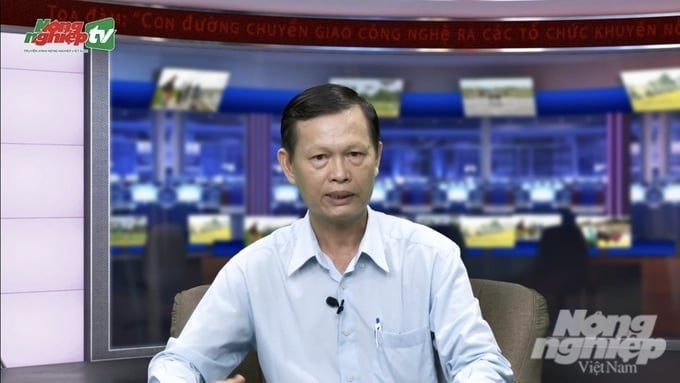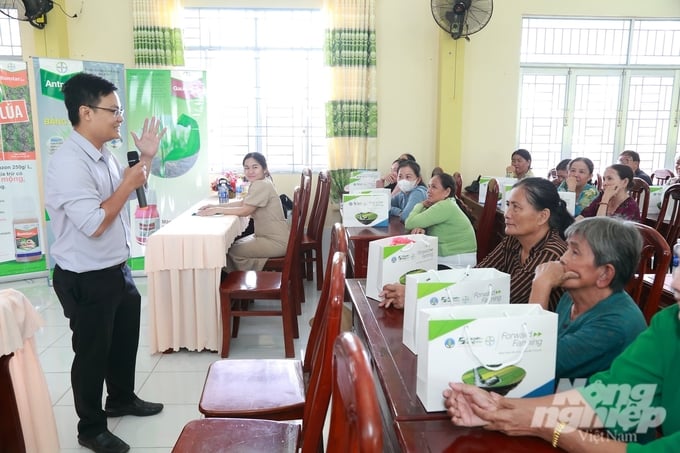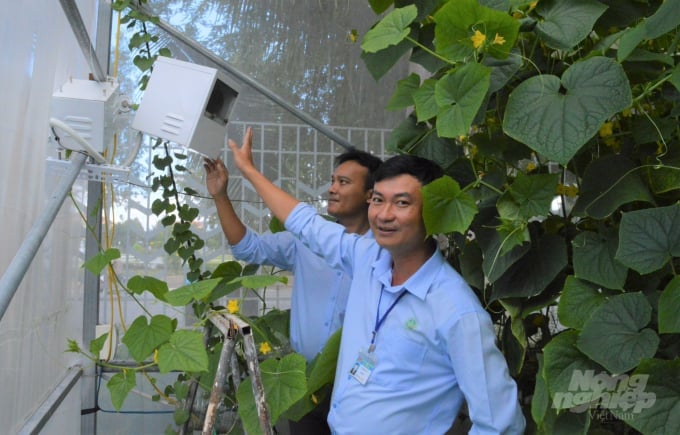May 29, 2025 | 16:11 GMT +7
May 29, 2025 | 16:11 GMT +7
Hotline: 0913.378.918
May 29, 2025 | 16:11 GMT +7
Hotline: 0913.378.918
Can Tho University in the Mekong Delta region is an institution that has made significant contributions in transferring the results of scientific and technological research to local agricultural extension units the population. Additionally, advanced technologies which are inaccessible for farmers will be transferred through the local agricultural extension workforce. However, the promotion of this effort to the population is a gradual process.

Dr. Dang Kieu Nhan, Director of the Mekong Delta Development Research Institute under Can Tho University, discussing with the Vietnam Agriculture Newspaper during a seminar on "Agricultural Extension Organization – Direct Transfer of Scientific Research Results." Photo: Ho Thao.
At the recent seminar themed "Agricultural Extension Organization – Direct Transfer of Scientific Research Results," organized by the Vietnam Agriculture Newspaper, Dr. Dang Kieu Nhan, Director of the Mekong Delta Development Research Institute under Can Tho University, emphasized that the promotion of new production technologies to farmers is a time-consuming process. Accordingly, the critical aspect involves changing the approach to which farmers access knowledge, thereby fostering their curiosity and interest. Farmers will apply these innovations when they acknowledge the efficiency of the experiences. As a result, the local agricultural extension workforce needs to innovate their approach towards cooperating with farmers.
Hau Giang province has established a team of nearly 150 agricultural extension officers at the Provincial Agricultural Extension Center and extension units at the district level. Moreover, the province recently established an additional 51 community-based extension teams at the communal level. Local agricultural extension officers have effectively completed the transfer of scientific and technological research results to farmers.
According to Mr. Mai Xuan Tan, Director of the Hau Giang Provincial Service and Agricultural Extension Center, the center has received several progressive technical research results and advanced scientific achievements from central agricultural extension institutions, research institutes, and other organizations. The center has subsequently disseminated these results to farmers through various platforms.

According to Dr. Dang Kieu Nhan, the local agricultural extension workforce needs to innovate its approach towards cooperating with farmers. Photo: Ho Thao.
This involves a focus on developing and expanding models for transferring scientific and technological knowledge to farmers. Namely, the center has shown interest in technology transfer through multimedia platforms such as YouTube, mainstream media channels such as radio and television, and other digital technologies within the province.
However, Mr. Tan also acknowledges the challenges facing the transfer of scientific and technological research results to farmers. Some research topics from smaller-scale institutions make it difficult to implement extensively at the local level due to their impracticality. Additionally, research result documents need to be translated into a language accessible to farmers for better comprehension and absorption.
According to Mr. Tan, the funding allocated for research topics is limited, and the selection of research topics needs be more tailored to the individual group of farmers. For example, specific research topics should address each demographic based on their economic conditions and understanding of scientific and technological research.

Hau Giang is one of the exemplary provinces in the Mekong Delta region with vibrant agricultural extension activities and numerous innovations in its operational models. Photo: TL.
Mr. Mai Xuan Tan emphasizes the importance of developing raw material production areas through collaboration between farmer organizations and businesses. Additionally, he believes that the adherence to regulations regarding economic and technical standards to support research and technology transfer models can cause significant delays in the local implementation of research results.
According to Dr. Dang Kieu Nhan, Vietnam's agricultural sector needs to change not only its approach towards cooperating with farmers but also its variety of agricultural extension models in the near future.
Dr. Nhan has proposed a new model called the "online agricultural extension force." Accordingly, this agricultural extension force's scope of operations will extend beyond providing information and knowledge remotely to farmers. It will act as a multimedia interactive form that involves close collaboration between scientists, businesses, and the farming community.
The objective of this online agricultural extension force is to assist farmers in solving daily agricultural production issues under varying local conditions. Subsequently, it will facilitate the application of scientific and technological research results in production. It also signifies the contributions of research institutes, universities, and other stakeholders in agricultural development, leading to positive improvements in agricultural production.
Translated by Nguyen Hai Long

(VAN) Ms. Nguyen Thi Dung, Deputy Director of Ngoc Hoang Cooperative, shared about the journey of bringing dragon fruit to Europe, achieving annual revenues in the billions of VND.

(VAN) Bamboo products from Thang Tho Bamboo Cooperative have reached many countries around the world, while also creating jobs for local workers.

(VAN) The Management Board of Con Dao National Park reported that a green sea turtle, tagged in the Philippines, has traveled thousands of kilometers to lay 84 eggs on Bay Canh Islet.

(VAN) Green technology is paving a new path for sustainable aquaculture in the Mekong Delta in particular and across the country in general, helping reduce emissions and adapt to climate change.

(VAN) On May 27, La French Tech Vietnam (the French startup and innovation community in Vietnam) held the French Tech Summit Vietnam 2025.
/2025/05/27/4731-2-223159_980.jpg)
(VAN) No votive paper, no styrofoam, no plastic bags, no plastic bottles, and no single-use plastic trays are the key rules tourists should keep in mind when visiting Con Dao.

(VAN) In the fight against plastic pollution, Vietnam has been demonstrating a proactive, pioneering, and active role in addressing the greatest environmental challenge today.